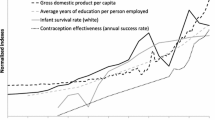Abstract
This paper is inspired by a puzzling empirical fact that, despite the importance of controlling migration for their future, the host countries allocate very limited amounts of resources to the struggle against illegal immigration. The present model analyzes this issue in the context of low fertility in the host countries and suggests a novel channel though which the intensity of the struggle against immigration can be related to fertility. The analysis shows that, for childless individuals, who have no reason to care about the future, it is optimal to contribute less to the costly immigration-prevention measures.
Similar content being viewed by others
Notes
Others have advocated transfers of resources to the source countries in order to reduce immigration pressure (see, e.g., Dula et al. 2006 and references therein).
Although the budgets allocated to the US border and domestic control have recently increased in response to immigration pressure, they are still far lower than, for example, the total flows of the US foreign aid.
An analysis of proimmigration lobbying efforts of capital owners along with further references can be found, for example, in Epstein and Nitzan (2006). Epstein et al. (1999) argue that if foreign workers do not wish to return home, any guest-worker program, even though its intention is a temporary stay, will inevitably create a population of illegal immigrants.
The assumption of an exogenously determined fertility differential between agents of different types that has been employed here is not crucial for this paper’s results. Any model with endogenous fertility will also generate a stronger effect of immigration on more fertile parents and, as a result, their optimal contribution to immigration-prevention measures will be higher. Some references to the large recent literature that employs endogenous fertility can be found, for example, in Azarnert (2008, 2009a). Cigno (2006) provides a renegotiation-proof constitutional theory of the family.
Further references along with a model that analyzes a negative effect of redistribution in favor of minorities on the incentives to invest in human capital among locals can be found in Azarnert (2009c).
This particular form of the utility function is inspired by the one formulated by Garcia (2006) as: U i (c i I) = C i − β i I, where i denotes skilled or unskilled native workers.
Because children in turn will be concerned about their children’s utility, a more general Barro-type utility function requires that the utility of parents should be represented by an infinite sum of utilities over different generations. However, because such utility function complicates the analysis without altering the qualitative nature of the results, in recent growth literature with endogenous fertility it became common to limit parental care to their own children only (see, e.g., references in Azarnert 2006, 2008, 2009a, b). In the context of the present model, parental care about the future generations will only increase the incentive for CH-type individuals to devote resources to the anti-immigration measures, relative to the NC-type individuals, thus strengthening the major message of the present paper.
If in period t the size of the native population is normalized to one, I t measures the fraction of population of immigrants to the native population.
Such behavior of NC type is optimal if their fraction in population is low enough and the amount of contribution of CH type is high enough.
References
Azarnert LV (2006) Child mortality, fertility and human capital accumulation. J Popul Econ 19(2):285–297
Azarnert LV (2008) Foreign aid, fertility and human capital accumulation. Economica 75:766–781
Azarnert LV (2009a) Free education, fertility and human capital accumulation. J Popul Econ. doi:10.1007/s00148-008-0205-8
Azarnert LV (2009b) Abortion and human capital accumulation: a contribution to the understanding of the gender gap in education. Scott J Polit Econ (in press)
Azarnert LV (2009c) Inter-ethnic redistribution and human capital investments. Mimeo, Bar Ilan University
Bauer TK, Lofstrom M, Zimmermann KF (2000) Immigration policy, assimilation of immigrants and natives’ sentiments toward immigrants: evidence from 12 OECD-countries. Swed Econ Policy Rev 7:11–53
Cigno A (2006) A constitutional theory of the family. J Popul Econ 19(2):259–283
Dula G, Kahana N, Lecker T (2006) How to partly bounce back the struggle against illegal immigration to the source countries. J Popul Econ 19(2):315–325
Dustmann C, Preston I (2001) Attitudes to ethnic minorities, ethnic context and local decisions. Econ J 111:353–373
Dustmann C, Preston I (2006) Is immigration good or bad for the economy? Analysis of attitudinal responses. Res Labor Econ 24:3–34
Dustmann C, Preston I (2007) Racial and economic factors in attitudes to immigration. B.E. J Econ Anal Policy 7(1, Advances):62
Epstein GS, Nitzan S (2006) The struggle over migration policy. J Popul Econ 19(4):703–723
Epstein GS, Hillman AL, Weiss A (1999) Creating illegal immigrants. J Popul Econ 12(1):3–21
Ethier WJ (1986) Illegal immigration: the host country problem. Am Econ Rev 76:56–71
Gang IN, Rivera-Batiz FL, Yun M-S (2002) Economic stain, ethnic concentration and attitudes toward foreigners in European Union. IZA dp. no. 578
Garcia AS (2006) Does illegal immigration empower rightist parties? J Popul Econ 19(4):649–670
Acknowledgements
Comments of Alessandro Cigno and two anonymous referees are gratefully acknowledged.
Author information
Authors and Affiliations
Corresponding author
Additional information
Responsible editor: Alessandro Cigno
Rights and permissions
About this article
Cite this article
Azarnert, L.V. Après nous le Déluge: fertility and the intensity of struggle against immigration. J Popul Econ 23, 1339–1349 (2010). https://doi.org/10.1007/s00148-009-0263-6
Received:
Accepted:
Published:
Issue Date:
DOI: https://doi.org/10.1007/s00148-009-0263-6




